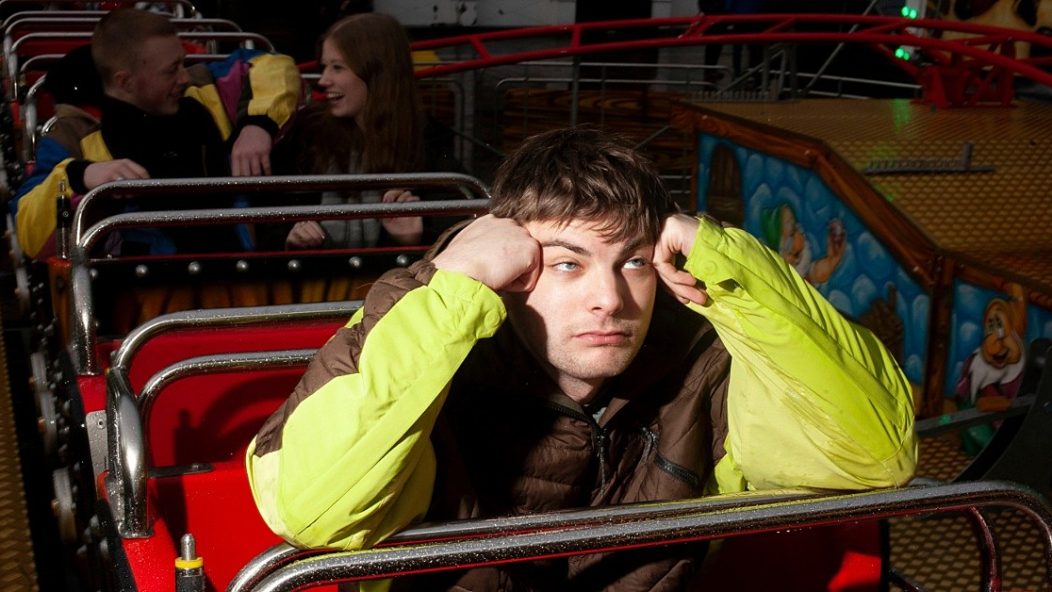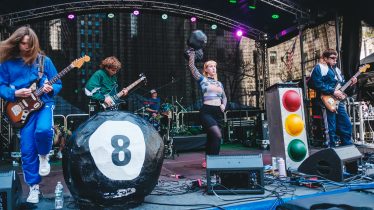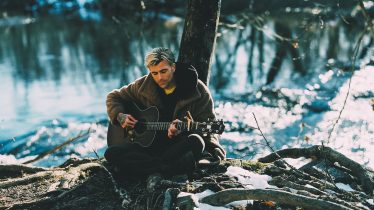
You’ve never heard Fontaines D.C.’s Grian Chatten like this
“All my words, they fail me now,” Grian Chatten sings during “Last Time Every Time Forever,” his voice carried along by the sort of lush, slightly off-beam instrumentation that would have lit a fire under electro-era Leonard Cohen.
We have never heard the vocalist, who is more attuned to delivering muscular post-punk with his band Fontaines D.C., quite like this before. On Chaos For The Fly (out now via Partisan), his first solo record, he’s searching for something, and often unsure of where he stands. He’s surrounded himself with people in the same situation, from gamblers seeking an out from reality in a broken-down seaside casino to people he loves taking their first step into the beyond.
Read more: Every Arctic Monkeys album ranked: From worst to best
Chaos For The Fly is a marvel of oddball character work and rich, surprising melodies, delivered with lived-in production courtesy of longtime collaborator Dan Carey. The sense of foreboding power that drives much of Fontaines’ music is pushed to one side in favor of isolated, vulnerable songs that situate their writer in unfamiliar locales. “It’s strange to dig into yourself like this,” he says.
When you announced Chaos For The Fly, you said you had “a couple of exaggerated aspects of my soul” that you wanted to put out there. What did you mean by that exactly?
Well, I’m not sure what gave rise to it, but I definitely have a very dramatic, fantastical approach to life. Often I feel things very extremely, and then nothing. I go from fits of numbness to believing that everything is an emotional cartoon. A lot of the songs were written in the latter state. There are songs where I feel I went so far, I’m almost embarrassed. I almost recoil when I hear them.
How did that feeling play into the decision not to take these songs to the band?
It’s a bit of a chicken-and-egg situation. I’m not really sure if the idea for doing a solo record came before the self-indulgence. With songs like “All of the People,” I feel like if I was to play that with Fontaines D.C., I might be a little bit wary that it would be like the Grian Show.
That’s interesting because I feel like, from the outside, there’s an element of respect for them as creative people in keeping these songs from them. They’re from you in a way that Fontaines D.C.’s material hasn’t been to this point.
I don’t want to rob myself of the chemistry that occurs when we stumble across an idea as a five-piece as well, you know? Writing songs is easy when it’s all you do, when it’s all you’re good for. You can knock them out. But we have a genuinely magical relationship, whereby people bring nothing into a room and leave with everything. Why would I cheat myself of that by bringing a whole album and being like, “This is done”? That’d be fucking horrible.
This is a solo record written chiefly on an acoustic guitar, but it’s not spare. The horns, the keys, and the strings are all important voices alongside your own.
There were a few that came to me with those arrangements fully formed, like “Bob’s Casino” and “Last Time Every Time Forever.” Those songs never existed without those strings and those horns, and then I think we opened other songs up to that kind of instrumentation in order to allow some cohesion to take place.
Your own presence is interesting here, too. These are some of the most obviously poetic lyrics we’ve heard from you, yet I think you’ve countered that by focusing very closely on melody. You haven’t gone with the obvious approach of talking them out standing beside a piano or whatever.
Maybe I believe that I’m better at melody than people thought. But I didn’t necessarily want to turn Fontaines D.C. into that. I think I wanted to exercise those muscles moving on, and rather than commit it to what is a bit of a sacred operation, I could do it in the relative shadow of my own solo project.
You wrote “Fairlies” between Jerez in Spain and Los Angeles, while other songs have deep roots much closer to home, on the East Coast of Ireland, or the same four walls during the pandemic. Are you someone who’s generally inspired by a sense of place?
I like feeling dwarfed, not by tall buildings, but by history. I’m very nostalgic. This is a shit reference, but sometimes I feel like Owen Wilson in Midnight in Paris. I’m easily picked up by a carriage full of fucking dead writers, you know?
Are you trying to insert yourself into that world?
Maybe I’m running away from my own insignificance.










